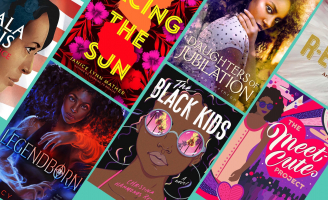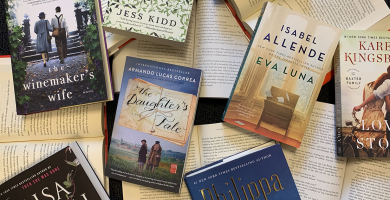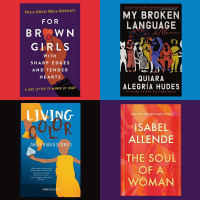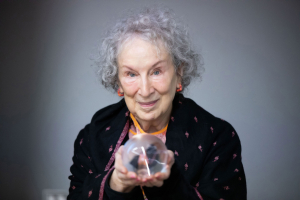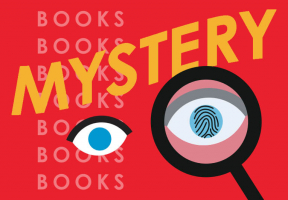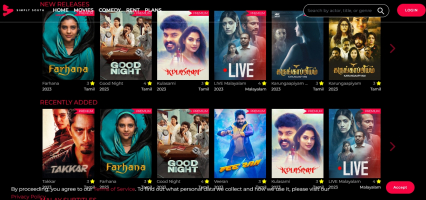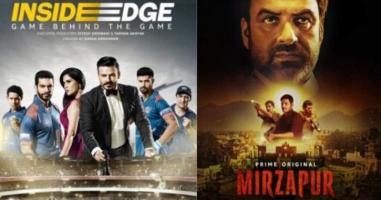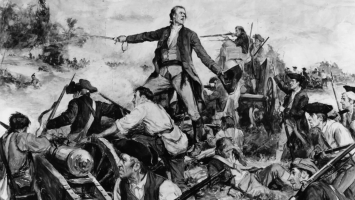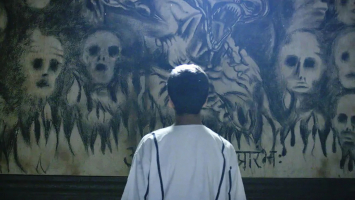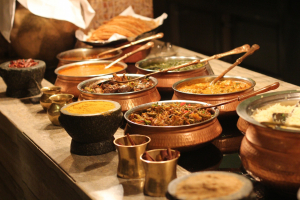Top 12 Most Famous Indian Authors
Since ancient times, India has been praised for its writing and literary works. In India, literature is written in more than twenty different languages, ... read more...including the more than twenty that are spoken there. The most famous Indian authors are listed below.
-
One of the most famous Indian authors of English literature, Mulk Raj Anand portrayed the life of the lower castes in traditional Indian culture.
He is a well-known novelist from India who writes on the pernicious traditions that have Indian roots. His writings frequently discuss traditional Indian society. The rigorous caste system in India is a practice that is bad for everyone. In his writings, Anand bravely discusses the abuse of people from lower social groups. A masterpiece of contemporary Indian English literature, Anand's novels and short tales are regarded for their insightful depictions of the lives of the downtrodden and their examinations of poverty, exploitation, and disaster.
Untouchable, Anand's debut book, makes this clear. The elimination of the caste system is central to the storyline. This 1935 book chronicles the life of Bakha, a sweeper who belongs to the lowest class of the despised Untouchables. Most of the time, he accepts it as a natural aspect of life. After all, he was raised in that manner. But a sequence of occurrences make him wonder about his existence and the part he plays in society.In more than half of the novel, Bakha commutes to work and does his duties while thinking about numerous concepts. With interactions with missionary organizations and demonstrations involving well-known politicians, the book's last portion has a more political tenor.
Born - Died: 1905-2004
Topics aimed at: lives of the poorer castes in traditional Indian society

Mulk Raj Anand - Photo on Wikimedia Commons (https://commons.wikimedia.org/wiki/File:Raj_Anand.jpg) Video on Study Lovers Kapil Ga -
Author, lawyer, diplomat, writer, and politician Khushwant Singh was from India. He was most recognized as a writer for his incisive secularism, humor, sarcasm, and unwavering devotion to poetry. He makes sharp-witted parallels between the social and behavioral traits of Westerners and Indians. Throughout the 1970s and 1980s, he served as editor of a number of literary and journalistic journals as well as two newspapers. He served as a member of the Rajya Sabha, the Indian Parliament's upper chamber, from 1980 and 1986.
As one of the most well-known Indian authors of English-language literature, Khushwant Singh has made a name for himself. He was an outstanding citizen in addition to being a brilliant writer. Additionally, he is the recipient of India's second-highest civilian accolade, the Padma Vibhushan. Through his writing, he also seeks to advance compassion and humanity.
His most well-known book, Train to Pakistan, which was written in 1956 and later adapted into a movie in 1998, was inspired by his experience with the 1947 Partition of India. His other notable works include The Portrait of a Lady, The Voice of God and Other Stories, The History of the Sikhs, and more.
Born - Died: 1915-2014
Topics aimed at: love and sex, sexual relationship of the hero, partition of India and Pakistan, ...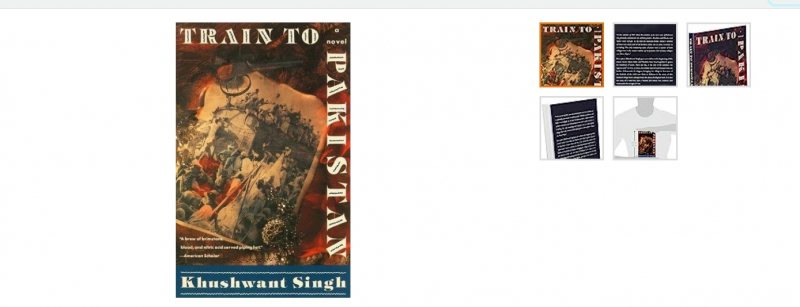
Train to Pakistan book - Screenshot of https://www.amazon.com/Train-Pakistan-Khushwant-Singh/dp/0802132219 Video on StudyIQ IAS -
Indian author and novelist R. K. Narayan is well known for his works that are set in the made-up South Indian town of Malgudi. Along with Raja Rao and Mulk Raj Anand, he was a notable early Indian English novelist.
Narayan emphasizes the social setting and regular activities of his characters. He has been likened to William Faulkner, who developed a comparable imaginary community and similarly examined the vitality of everyday life with comedy and compassion. Because of his talent for condensing a narrative, Guy de Maupassant has been likened to Narayan's short tales.
Over the course of a career spanning more than 60 years, Narayan was honored with a number of prizes and honors, including the AC Benson Medal from the Royal Society of Literature, the Padma Vibhushan and the Padma Bhushan, India's second and third highest civilian awards, as well as the Sahitya Akademi Fellowship in 1994, the highest award given by the country's national academy of letters. Additionally, he received a nomination for the Rajya Sabha, the Indian Parliament's upper body.
R.K. Narayan's book "The Guide" distinguishes out from his other books since it is written for an older readership. The plot's detours and turns in the book are really realistic. The narrative is so wonderful since the book delves into several stages of the protagonist Raju's life. Readers may find Raju's lack of luck, which is not the same as bad luck, charming since it portrays the child's innocence, which is present throughout most of his life. He frequently comes within an inch of victory, but when he falters, the abyss is so great that he plummets to the ground.
Born - Died: 1906-2001
Topics aimed at: the social context and everyday life of his characters
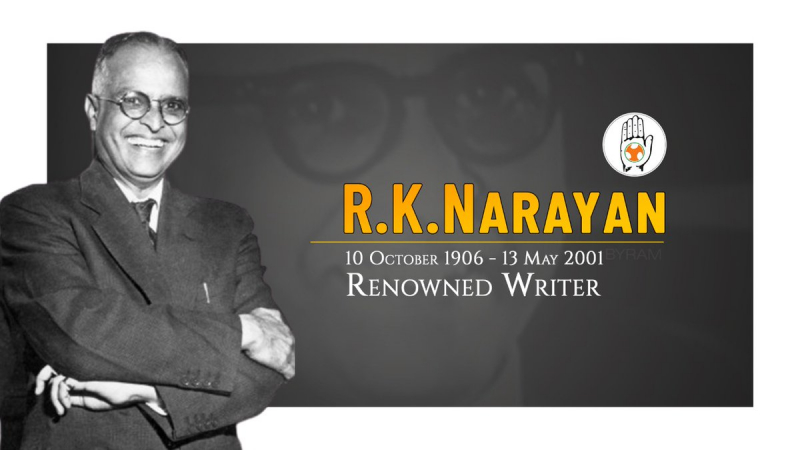
Photo by Goa Pradesh Youth Congress on Twitter Video on Study Lovers Kapil Gangwani -
Novelist Salman Rushdie is a British-American of Indian descent. His stories frequently involve links, clashes, and migrations between Eastern and Western cultures and are generally situated on the Indian subcontinent. His work frequently mixes magic realism with historical fiction.
Salman Rushdie has received both critical and financial recognition, making him one of the most well-known Indian authors. His book Midnight's Children, which won the prestigious Booker Prize in 1981, was declared the finest Booker winner ever on both the 25th and 40th anniversaries of the award. In the past, only authors from Ireland, South Africa, and the Commonwealth-which includes Canadian, New Zealand, and Australian authors, as well as authors from the United Kingdom-were eligible for the Booker Prize, which is now open to all English-language novels.
Rushdie is a major figure in postcolonial writing in general and has impacted a generation of Indo-Anglian writers in addition to mentoring younger Indian (and ethnic-Indian) writers. He criticized the British government's passage of the Racial and Religious Hatred Act, which he discusses in his article for the Penguin collection of essays Free Expression Is No Offense, which was released in November 2005.Born - Died: 1947-1964
Topics aimed at: connections, disruptions, and migrations between Eastern and Western civilizations, typically set on the Indian subcontinent
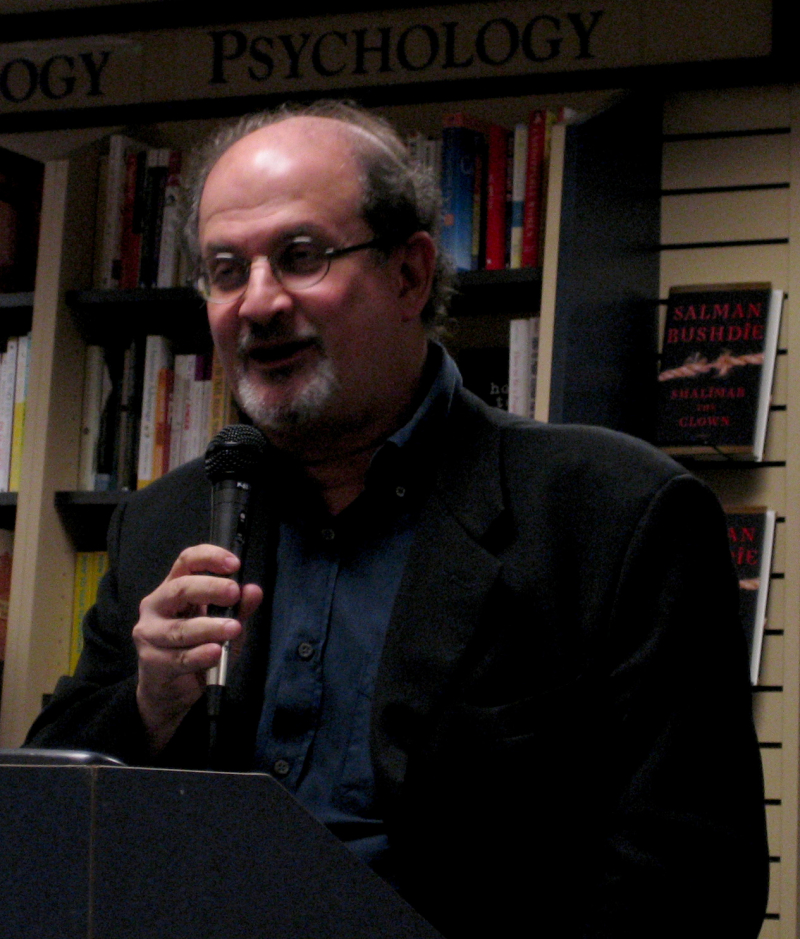
Photo on Wikimedia Commons (https://commons.wikimedia.org/wiki/File:Salman-Rushdie-2.jpg) Video on Financial Times -
An Indian novelist, journalist, and YouTuber by the name of Chetan Bhagat. In 2010, he was on Time magazine's list of the 100 most influential people in the world. Film versions of five of his books have been produced.
In the early 2000s, Bhagat began writing "Five Point Someone," his debut book, when he was employed by Goldman Sachs in Hong Kong. He stated in an interview that he completed the work in around 15 drafts and that he sent the finished manuscripts to different publishers.
The Delhi-based publishing business Rupa Publications ultimately agreed to publish the work, and it did so in 2004. The narrative of three IIT students, who believe they are performing below averagely compared to other students there, is told in the book. The narrative was turned into a movie called "3 Idiots" by director Rajkumar Hirani, starring Aamir Khan, R. Madhavan, Sharman Joshi, and Kareena Kapoor. It went on to become one of the greatest Bollywood films of all time.
Following the popularity of his debut book, he began writing "One Night @ the Call Center," his second book, which was released in 2005. The book was also a hit. The first three days after its debut saw the sale of about 50,000 copies. It quickly became the most popular book in India at the time. The novel was also made into a film, "Hello," whose script was written by Chetan and Atul Agnihotri.
Bhagat made the decision to devote his whole time to writing. His third book, "The 3 Mistakes of My Life," which was released in 2008, was likewise quite successful. The literature on which the Bollywood film "Kai Po Che" is based.Born: 1974
Topics aimed at: real-life love story
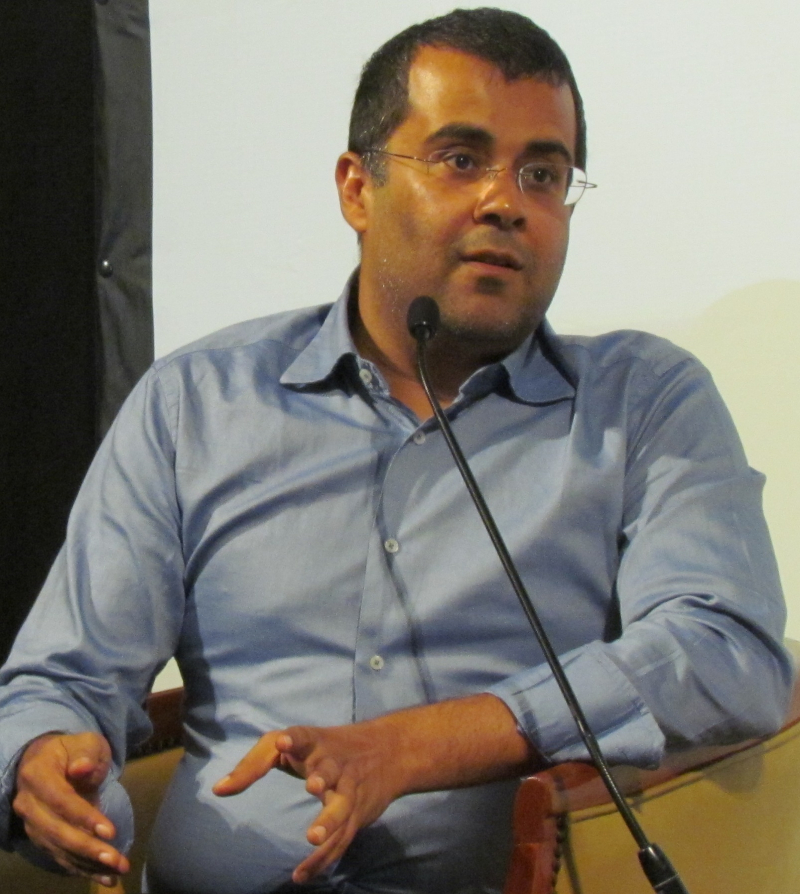
Photo on Wikimedia Commons (https://commons.wikimedia.org/wiki/File:Chetan_bhagat_1.jpg) 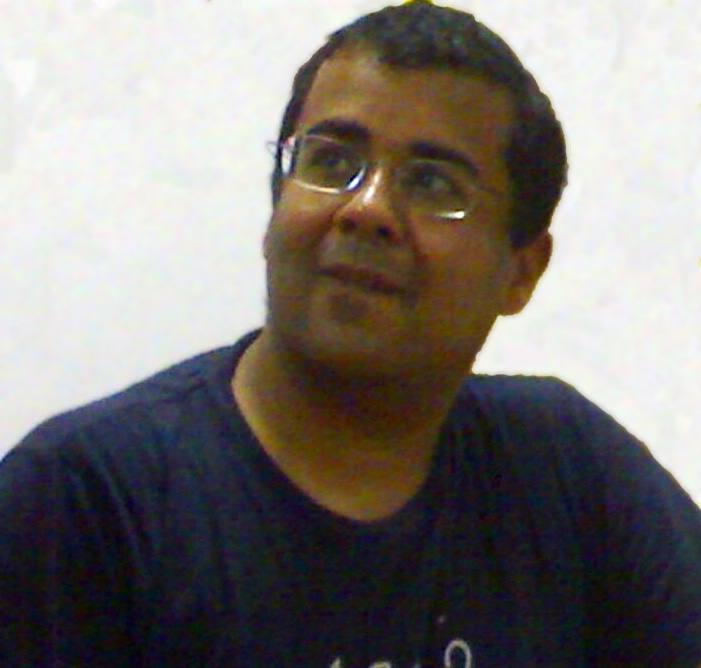
Photo on Wikimedia Commons (https://commons.wikimedia.org/wiki/File:Chetan_bhagat.jpg) -
Punjabi and Hindi were the languages used by Indian author, essayist, and poet Amrita Pritam. She is a well-known author in Punjabi literature and the 1956 Sahitya Akademi Award winner. Her corpus of work included more than 100 volumes that were all translated into numerous Indian and international languages. These books included poetry, fiction, biographies, essays, a collection of Punjabi folk melodies, and an autobiography.
Pritam is most known for the moving poem Ajj aakhaan Waris Shah nu, which she wrote as a way of expressing her sorrow over the atrocities committed during the partition of India. It is an elegy to the 18th-century Punjabi poet. Her most well-known novel, Pinjar ("The Skeleton," 1950), which was also the basis for the award-winning film Pinjar (2003), introduced the unforgettable Puro, a symbol of brutality against women, loss of humanity and eventual submission to existential fate.
Pritam was exposed to poetry and literature at an early age, which led her later in life to write poetry and novels. She was a brave woman who, in the years before division, wrote contentious books without fear. She experienced hardships during the partition of India, which inspired her to create the Punjabi novel "Pinjar" (skeleton), which exposes the helplessness and prejudice experienced by women during the period. The book was eventually adapted into a Bollywood film, which became popular across the country.Born - Died: 1919-2005
Topics aimed at: massacres during the partition of India
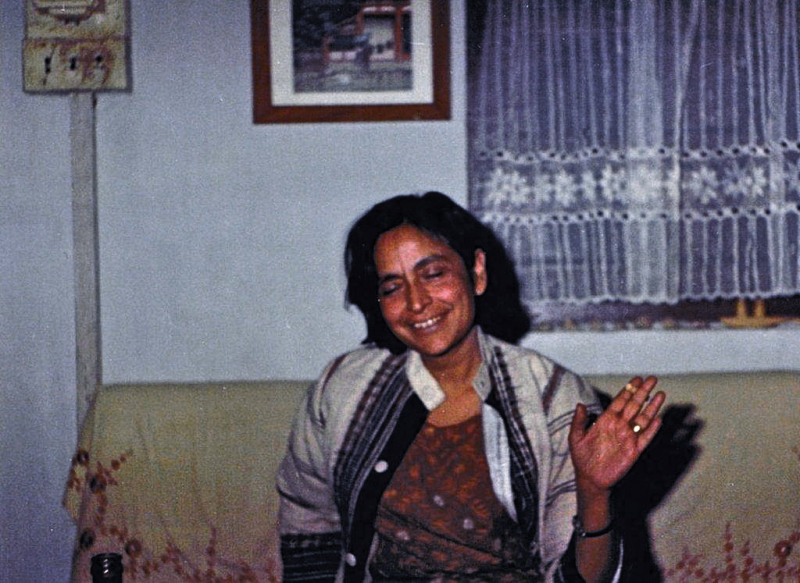
Photo on Wikimedia Commons (https://commons.wikimedia.org/wiki/File:Amrita_Pritam-New_Delhi-Dec_1969-Pic_Ravinder_Ravi.jpg) Video on kalArt - Poetry, Story -
Indian novelist Suzanna Arundhati Roy is most known for her 1997 book The God of Small Things, which won the Booker Prize for Fiction and became the greatest-selling book by an Indian author who is not an expat. She is a political activist who supports environmental and human rights concerns.
She penned the screenplays for Electric Moon (1992) and In Which Annie Gives it Those Ones (1989), a film based on her experiences as an architectural student in which she also made an appearance. Throughout their marriage, her husband, Pradip Krishen, served as the director for both. Roy's 1988 screenplay for In Which Annie Gives It Those Ones received the National Film Award for Best Screenplay.
Arundhati Roy contributed to the 2009 book We Are One: A Celebration of Tribal Peoples, which examines the cultures of people all around the world while highlighting both their uniqueness and the dangers to their survival. The organization for indigenous rights called Survival International receives revenues from the sale of this book.
She's penned a lot of pieces about modern politics and society. They were compiled in a five-volume series by Penguin India in 2014. Her nonfiction was compiled in a single volume called My Seditious Heart, which Haymarket Books released in 2019.Born: 1961
Topics aimed at: Contemporary politics and culture
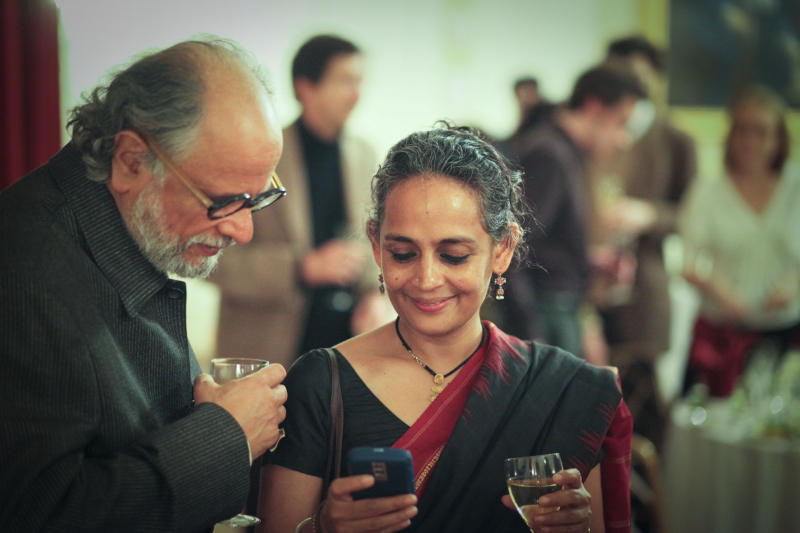
Photo on Wikimedia Commons (https://commons.wikimedia.org/wiki/File:Arundhati_Roy_and_Homi_K._Bhabha.jpg) 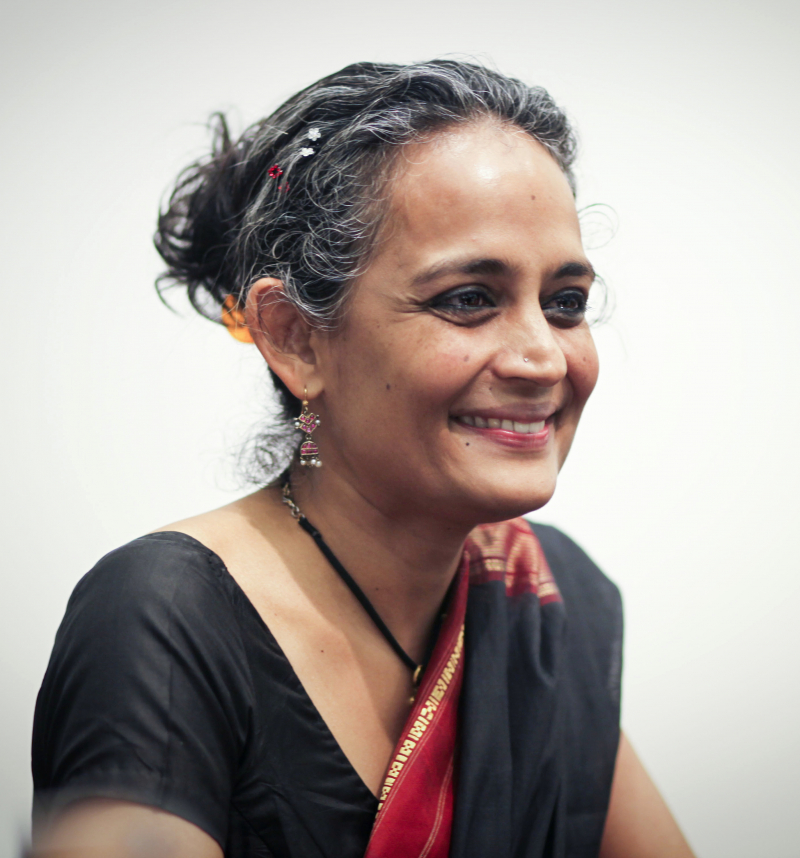
Photo on Wikimedia Commons (https://commons.wikimedia.org/wiki/File:Arundhati_Roy_3.jpg) -
Kiran Desai is one of the most famous Indian authors. She is the daughter of novelist Anita Desai. After spending her early years in Punjab and Mumbai, where she attended Cathedral and John Connon School, Kiran was born in Delhi. At the age of 14, she and her mother left India and spent a year living in England before relocating to the United States. At Columbia University, Hollins University, and Bennington College, Kiran Desai pursued her creative writing studies.
Her book The Inheritance of Loss received both the National Book Critics Circle Fiction Award and the Man Booker Prize in 2006. She was named one of the 20 "most influential" Indian women in the world by The Economic Times in January 2015.
Hullabaloo in the Guava Orchard, Desai's debut book, was released in 1998 and drew praise from people like Salman Rushdie. The Society of Authors' Betty Trask Award, granted to the finest new novels by Commonwealth of Nations residents under the age of 35, was given to it.
The Inheritance of Loss, her second novel, was favorably appreciated by critics in Asia, Europe, and the United States. Both the 2006 National Book Critics Circle Fiction Award and the 2006 Man Booker Prize went to it. At age 35, Desai became the youngest woman to ever receive the Booker Prize (Eleanor Catton beat this record in 2013).Born: 1971
Topics aimed at: Young Indian woman out in India and the world
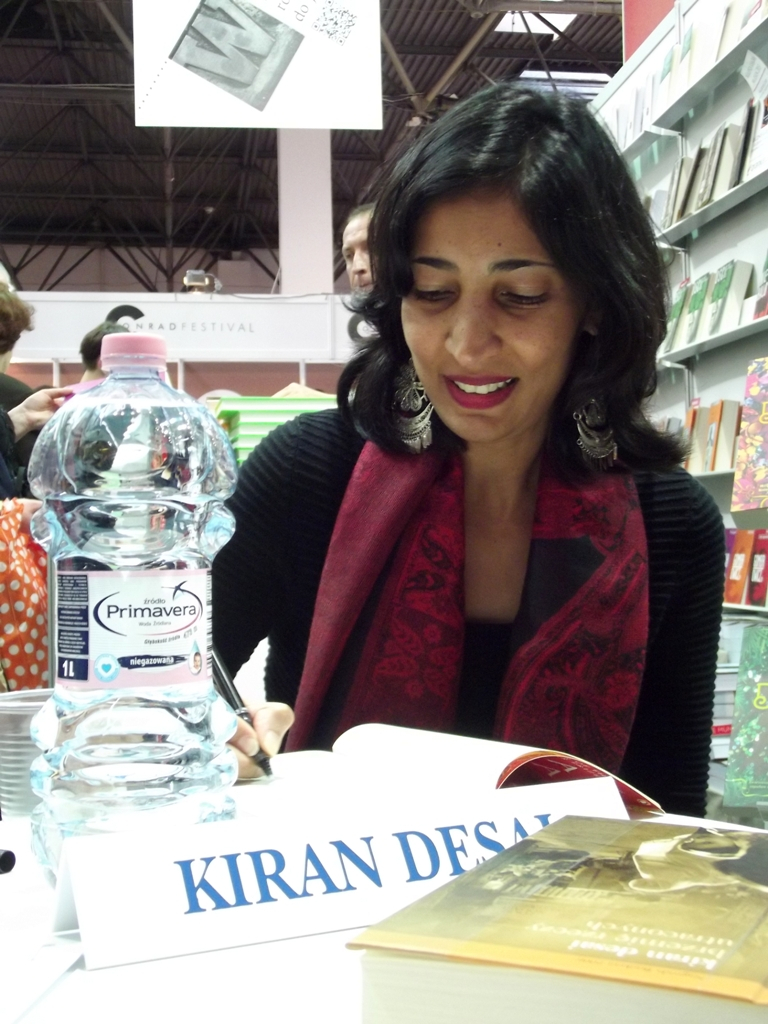
Photo on Wikimedia Commons (https://commons.wikimedia.org/wiki/File:Kiran_Desai_2013.jpg) Video on Louisiana Channel -
A poet and writer from India, Vikram Seth. He has published many books of poetry and fiction. Seth, a Calcutta native, was the editor of The Doon institution Weekly while he was a student at the all-boys institution. When his time at Doon was through, he transferred to Tonbridge School in England. Later, he started working at Stanford to get his Ph.D., but he never finished it.
Gurdial Singh, a mountaineer and his student's instructor at Doon, inspired him in many ways. He taught him geography and, in the words of Leila Seth, "guided Vikram in many ways...encouraged him to appreciate Western classical music and instilled in him a love of adventure and daring."
Seth has written three novels and several poetry collections. A Suitable Boy, Seth's debut book, propelled him to the top of the Indian literary scene. In 2020, the tale was turned into a BBC television program. Mappings and Beastly Tales from Here and There are two of Seth's other well-known poetry collections.
Seth has received several honors, including the Pravasi Bharatiya Samman (2005), the Commonwealth Writers Prize for A Suitable Boy (1994), the Thomas Cook Book Award for From Haven Lake: Travels Through Sinkiang and Tibet (1983), and the Crossword Book Award for An Equal Music (1999).Born: 1952
Topics aimed at: adventure and daring
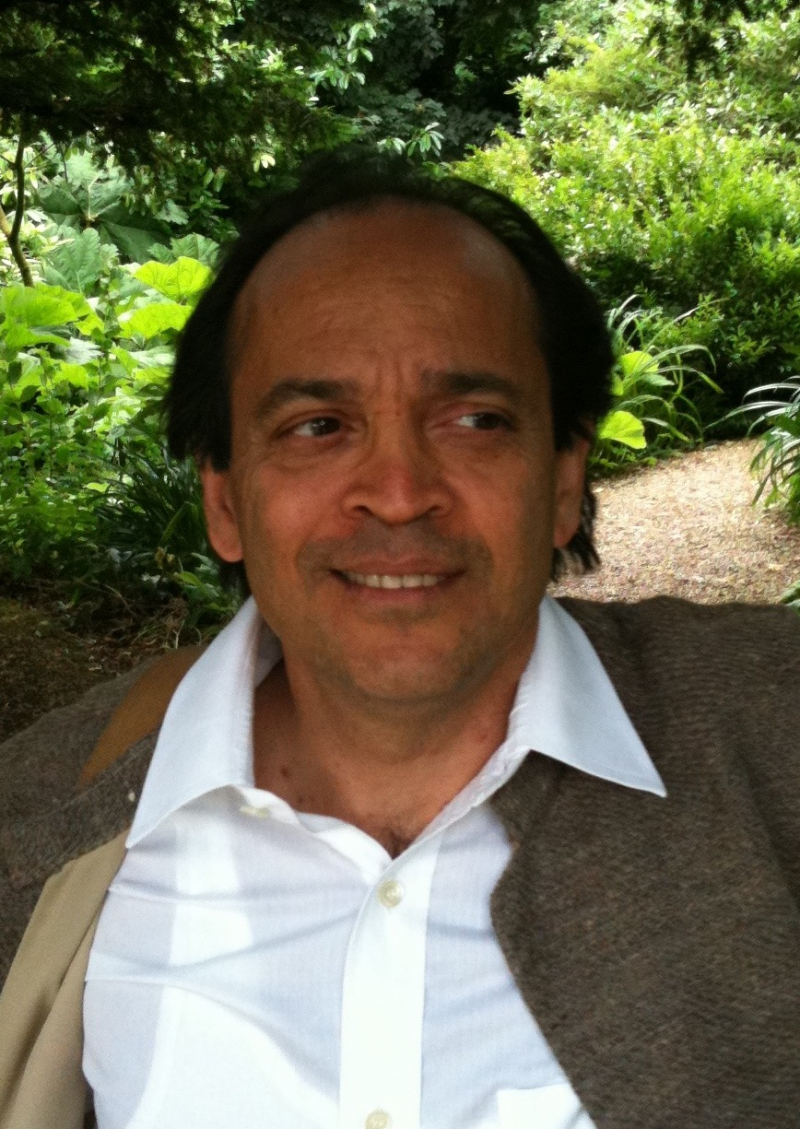
Photo on Wikimedia Commons (https://commons.wikimedia.org/wiki/File:Vikram_Seth,_in_Oxfordshire_%28cropped%29.jpg) Video on WION -
Early in the 20th century, Sarat Chandra Chattopadhyay was a Bengali novelist and short story writer. The majority of his works are concerned with Bengal's modern social customs and the way of life, tragedy, and struggle of the local people. He continues to be the most read, translated and adapted Indian novelist ever.
As a result of his father's sporadic employment, he came from a household that was in poverty. But Sarat's father was a writer and a dreamer, and it was his enthusiasm that encouraged Sarat to pursue a career as a novelist. Only when he was in his teens did he pen his first notable writings. Later, he intermittently contributed to periodicals.
Sarat Chandra used to go from country to village, interact with the locals, and spend time beyond Bengal in foreign countries. The experiences he gained are what gave his literary works their distinctive and graceful style. His debut book, Badadidi (1907), was published in the Bharati and launched his career. Later, he produced a number of short tales and novels. Being a feminist, Chattopadhyay felt compelled to write urgently against intolerance and oppressive culture. His most well-known works were "Devdas" (1901, published in 1917), "Parineeta," "Biraj Bau," and "Palli Samaj" (1914).
Born - Died: 1876-1938
Topics aimed at: Lifestyle, tragedy and struggle of the village people
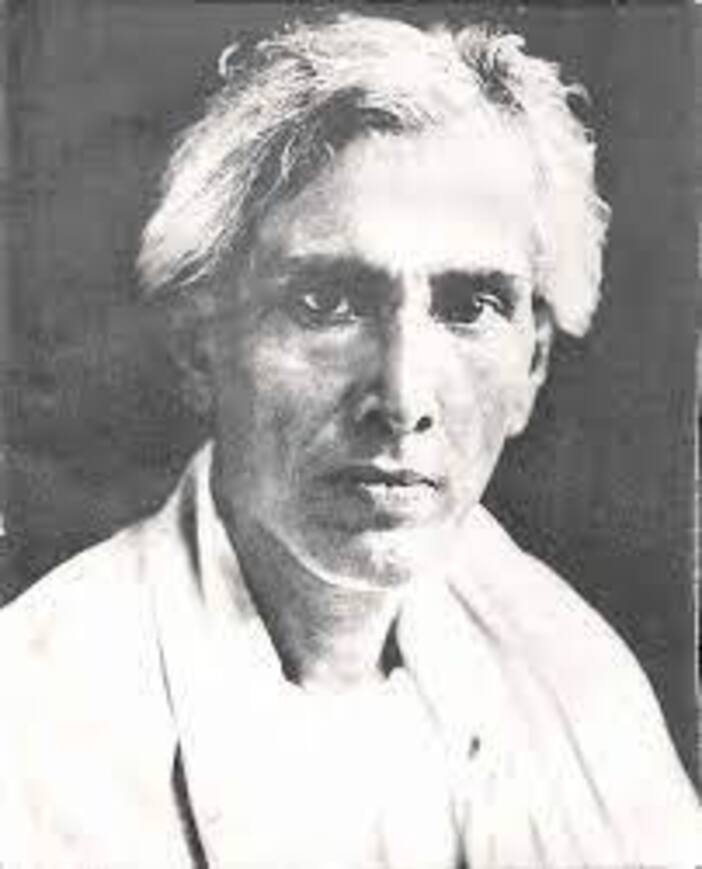
Photo on Store norske leksikon (https://snl.no/Sharat_Chandra_Chatterjee) Video on NH Tv Bangla -
Amitav Ghosh is one of the most famous Indian authors. The highest literary award in India, the 54th Jnanpith Award, was given to him in 2018. The ambitious books of Ghosh explore the essence of national and human identity, notably that of the people of India and South Asia, using sophisticated narrative techniques. He has authored nonfiction books on subjects like colonialism and climate change in addition to historical fiction.
Ghosh attended The Doon School in Dehradun and then graduated from Oxford University with a degree in social anthropology. He held positions at many academic institutions as well as the New Delhi-based Indian Express newspaper. After the 1986 release of his debut novel The Circle of Reason, he went on to write other fictional works including The Shadow Lines and The Glass Palace. He worked on the Ibis trilogy, which explores the events leading up to and effects of the First Opium War, between 2004 and 2015. His non-fiction works include The Great Derangement: Climate Change and the Unthinkable and In an Antique Land.
Ghosh has received four honorary doctorates and two Lifetime Achievement Awards. He received the Padma Shri, one of India's highest honors, in 2007 from the Indian President. He shared a Dan David prize in 2010 with Margaret Atwood, and in 2011 he won the festival's Grand Prize at Montreal's Blue Metropolis. He was the first author in the English language to win the prize. He was recognized as one of the most significant global thinkers of the last ten years by Foreign Policy magazine in 2019.
Born: 1956Topics aimed at: nature of national and personal identity
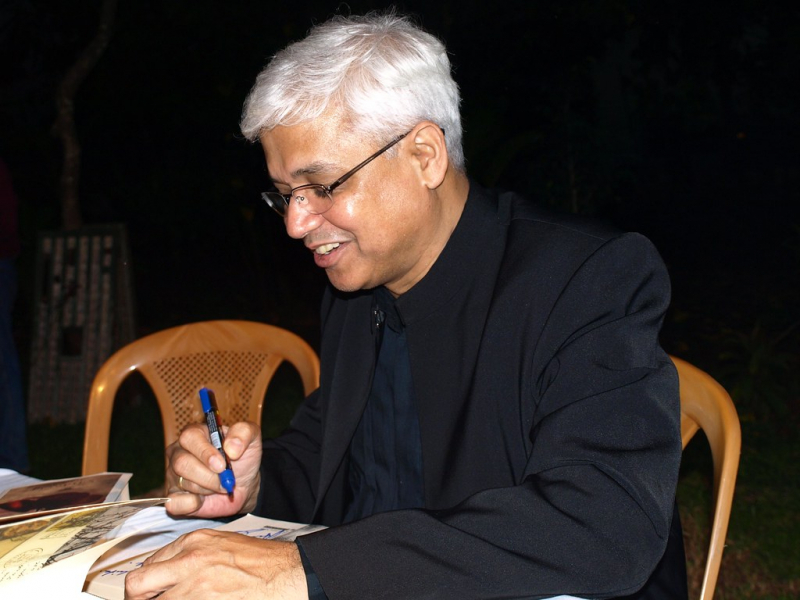
Photo on Flickr (https://www.flickr.com/photos/fn-goa/2608802158) Video on The Earth Commons -
Bengali poet, author, dramatist, musician, philosopher, social reformer, and artist Rabindranath Tagore also painted. In the late 19th and early 20th centuries, he used contextual modernism to transform Indian art, Bengali literature, and music.
Gitanjali was the first non-European and the first lyricist to win the Nobel Prize in Literature in 1913. He is the author of the "profoundly sensitive, fresh, and beautiful" poetry. Tagore's "elegant prose and magical poetry" are largely unknown outside of Bengal, despite the fact that his lyrical lyrics were considered to be spiritual and mercurial. He was a Royal Asiatic Society fellow. Tagore was referred regarded as "the Bard of Bengal" and went by the nicknames Gurudeb, Kobiguru, and Biswokobi.
Since his mother had passed away while he was a little boy and his father had a busy schedule, Tagore was primarily reared by servants. The Bengal Renaissance was spearheaded by the Tagore family. In addition to hosting literary magazine publications, they frequently presented theater performances and recitals of Bengali and Western classical music.
He was one of the first authors in India to break free from formal conventions and conventional poetry patterns. He had been outspoken in his opposition to the Raj for more than 50 years before to India's independence. The finest writers from India and other parts of the world continue to be inspired by his work. His writing, which has been translated into many other languages, has impacted a huge number of authors, including Pablo Neruda and Octavio Paz.
Born - Died: 1861-1941
Topics aimed at: spiritual and mercurial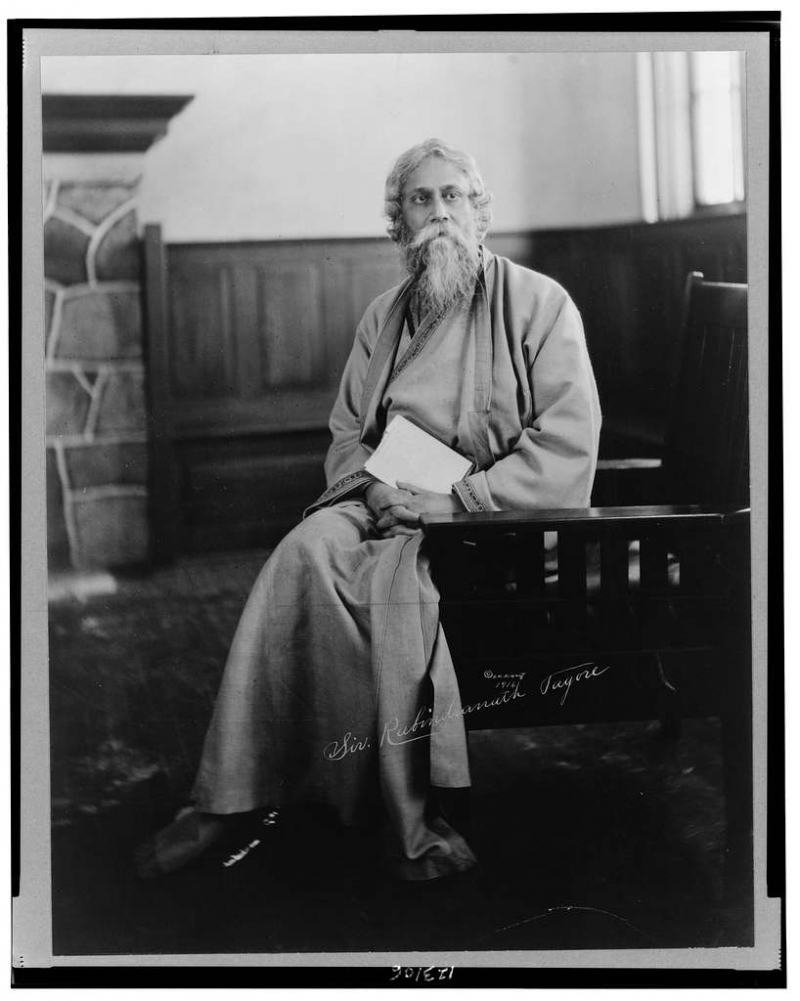
Photo on LOC's Public Domain A (https://loc.getarchive.net/media/rabindranath-tagore-full-length-portrait-seated-facing-front) 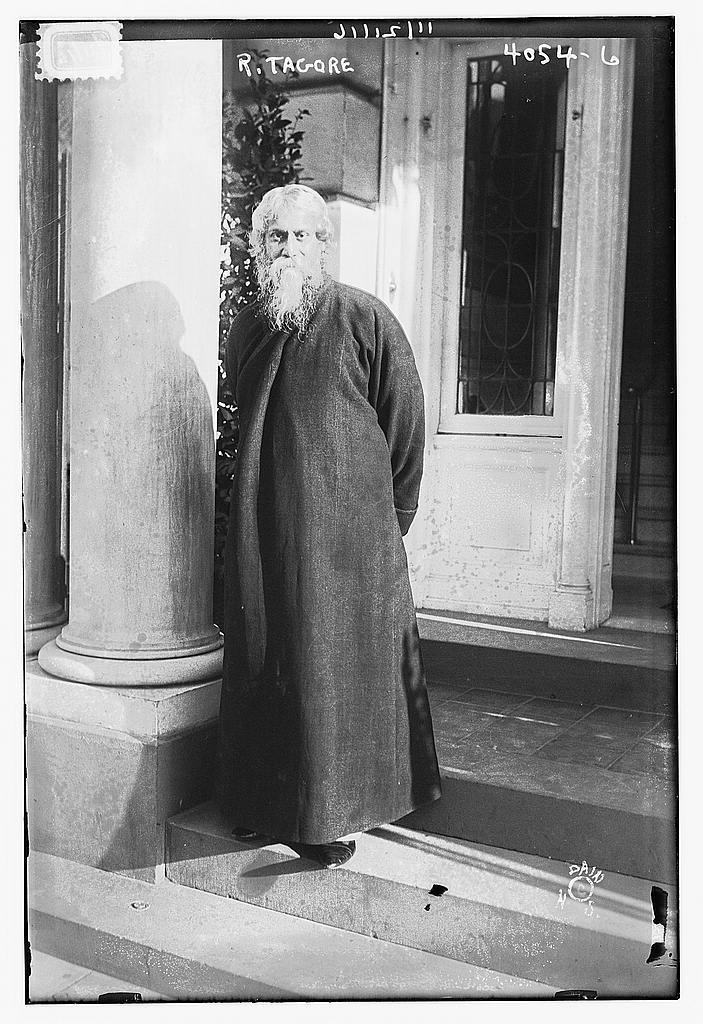
Photo on LOC's Public Domain A (https://loc.getarchive.net/media/r-tagore)














